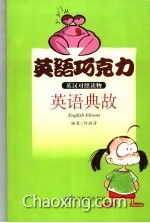典故的英文(请教一句带有典故的英文句子的意思)
1.请教一句带有典故的英文句子的意思
我是这样理解,希望也能帮助你理解。
他们没有一位像伊俄拉俄斯这样的朋友来用烧红的烙铁来切断九头蛇的头的根部,所以只能眼睁睁看着它一个头被粉碎,又迅速长出另一个头来。
burn with a hot iron the root of the hydra's head 其实就是
burn the root of the hydra's head with a hot iron用烧红的烙铁来切断九头蛇的头的根部
这样说你应该能理解吧?
理解这个句子需要知道点典故哦,顺便说下吧
九头蛇在希腊神话中的名称是九头蛇许德拉,许德拉是堤丰和厄喀德那所生的女儿。她是在阿耳哥利斯的勒那沼泽地里长大的,常常爬到岸上,糟蹋庄稼,危害牲畜。她凶猛异常,身躯硕大无比,是个九头的蛇怪,其中八个头可以杀死,而第九个头,即中间直立的一个却是杀不死的。这个畜生最后也是被英雄赫拉克勒斯所杀,英雄的助手伊俄拉俄斯在战斗中用熊熊燃烧的树枝灼烧被英雄砍下来但是又刚长出来的蛇头,不让它长大,赫拉克勒斯则乘机砍下许德拉的那颗不死的头,将它埋在路旁,上面压着一块沉重的石头。接着,他又把蛇身劈作两段,并把箭浸泡在有毒的蛇血里。从此以后,中了他箭的敌人再也无药可医。
2.英语中常用的典故
1. Practice makes perfect.熟能生巧。
2. God helps those who help themselves.天助自助者
3. Easier said than done.说起来容易做起来难。
4. Slow and steady wins the race.稳扎稳打无往而不胜。
5. A fall into the pit, a gain in your wit.吃一堑,长一智。
6. Where there is a will,there is a way.有志者事竟成。
7. One false step will make a great difference.失之毫厘,谬之千里。
8. It's never too old to learn.活到老,学到老。
9. All that glitters is not gold.闪光的未必都是金子。
10. Experience is the mother of wisdom.实践出真知。
11. All work and no play makes jack a dull boy.只工作不休息,聪明孩子也变傻。
12. Beauty without virtue is a rose without fragrance.无德之美犹如没有香味的玫瑰,徒有其表。
13. More hasty,less speed.欲速则不达。
14. Rome was not built in a day.伟业非一日之功。
15. Great minds think alike.英雄所见略同。
16. A journey of a thousand miles begins with a single step.千里之行始于足下。
17. Look before you leap.三思而后行。
18. Facts speak plainer than words.事实胜于雄辩。
19. Call back white and white back.颠倒黑白。
20. well begun,half done.好的开始等于成功的一半。
21. It is hard to please all.众口难调。
22. Ill news travels fast.坏事传千里。
23. Out of sight,out of mind.眼不见,心不念。
24. Beauty will buy no beef.漂亮不能当饭吃。
25. Like and like make good friends.趣味相投。
26. First things first.凡事有轻重缓急。
27. A friend in need is a friend indeed.患难见真情。
28. To live is to learn,to learn is to better live.活着为了学习,学习为了更好的活着。
29. live not to eat,but eat to live.活着不是为了吃饭,吃饭为了活着。
30. Action speaks louder than words.行动胜过语言。
31. East or west,home is the best.金窝银窝不如自家草窝。
32. It's not the gay coat that makes the gentleman.君子在德不在衣。
33. An idle youth,a needy age.少壮不努力,老大徒伤悲。
34. As the tree,so the fruit.种瓜得瓜,种豆得豆。
35. The older, the wiser.姜是老的辣。
3.帮忙取个好听有典故的英文名
Scarlett 斯嘉丽
是小说《飘》女主人公的名字,你说关心活泼可爱,古灵精怪,那不就和斯嘉丽一样嘛~斯嘉丽不仅如此,而且勇敢坚强,无论是失去亲人,失去感情还是失去战争中摧毁的幸福生活,她都没有被打倒,而是挑起了养活一整家人以及生命垂危好友的重担,以前的任性骄纵自私一扫而光,变成了一个成熟能干的女人。她同时也勇于追求自己的爱情,绝不轻言放弃。
tomorrow is another day就是她的名言,鼓励自己永远充满着希望。
关心是你的女儿吗?~希望她幸福成长~
4.求有历史典故的英文名字,要说明历史典故哦~
Homer 《荷马史诗》是相传由古希腊盲诗人荷马创作的两部长篇史诗《伊利亚特》和《奥德赛》的统称。两部史诗都分成24卷,这两部史诗最初可能只是基于古代传说的口头文学,靠着乐师的背诵流传。它作为史料,不仅反映了公元前11世纪到公元前9世纪的社会情况,而且反映了迈锡尼文明。它再现了古代希腊社会的图景,是研究早期社会的重要史料。《荷马史诗》不仅具有文学艺术上的重要价值,它在历史、地理、考古学和民俗学方面也提供给后世很多值得研究的东西。
荷马史诗是相传由古希腊盲诗人荷马创作的两部长篇史诗《伊利亚特》和《奥德赛》的统称。关于荷马所生的年代和是否确有其人都存在争议。比较普遍的看法认为他可能生在公元前9、8世纪之间。 两部史诗都分成24卷,《伊利亚特》共有15693行,《奥德赛》共有12110行。这两部史诗最初可能只是基于古代传说的口头文学,靠着乐师的背诵流传。荷马如果确有其人,应该是将两部史诗整理定型的作者。《伊利亚特》和《奥德赛》处理的主题分别是在特洛伊战争中,阿喀琉斯与阿伽门农间的争端,以及特洛伊沦陷后,奥德修斯返回绮色佳岛上的王国,与皇后珀涅罗珀团聚的故事。 《荷马史诗》是早期英雄时代的大幅全景,也是艺术上的绝妙之作,它以整个希腊及四周的汪洋大海为主要情节的背景,展现了自由主义的自由情景,并为日后希腊人的道德观念(进而为整个西方社会的道德观念),立下了典范。继此而来的,首先是一种追求成就,自我实现的人文伦理观,其次 是一种人神同性的自由神学,剥除了精神世界中的神秘恐惧。《荷马史诗》 于是成了“希腊的圣经”。 公元前11世纪到公元前9世纪的希腊史称作“荷马时代”,因荷马史诗而得名。荷马史诗是这一时期唯一的文字史料。 《荷马史诗》相传是由盲诗人荷马写成,实际上它是许多民间行吟歌手的集体口头创作,由荷马加工整理而成。史诗包括了迈锡尼文明以来多少世纪的口头传说,到公元前6世纪才写成文字。
5.求几个成语故事的英文
狐假虎威: The Ass in the Lion's Skin
An Ass once found a Lion's skin which the hunters had left out in the sun to dry.
He put it on and went towards his native village.
All fled at his approach, both men and animals, and he was a proud Ass that day.
In his delight he lifted up his voice and brayed, but then every one knew him, and his owner came up and gave him a sound cudgelling for the fright he had caused.
And shortly afterwards a Fox came up to him and said: "Ah, I knew you by your voice."
Fine clothes may disguise, but silly words will disclose a fool.
录自:
龟兔赛跑 The Tortoise and the Hare
The hare was once boasting of his speed before the other animals. "I have never yet been beaten," said he, "when I put forth my full speed. I challenge anyone here to race with me."
The tortoise said quietly, "I accept your challenge."
"That is a good joke," said the hare. "I could dance around you all the way."
"Keep your boasting until you've beaten," answered the tortoise. "Shall we race?"
So a course was fixed and a start was made. The hare darted almost out of sight at once, but soon stopped and, to show his contempt for the tortoise, lay down to have a nap. The tortoise plodded on and plodded on, and when the hare awoke from his nap, he saw the tortoise nearing the finish line, and he could not catch up in time to save the race.
Plodding wins the race.
录自:
/fables 还有许多其他故事, 你自己去挑吧!
6.简洁的成语故事(英文版)
A man from the State of Zheng bought shoes)Once upon a time , a man in the State of Zheng went to the market to buy a pair of shoes. Before he left for the market, he had measured his feet with a piece me straw. However , he couldn't find the measurement because he had left it at home . So he had to say sorry to the owner that he had to go home for it, which confused the owner why he didn't try the shoes on with his own feet . The man smiled to the owner , " I would rather believe in the measuremens than my own feet."。
7.哪里有关于英语典故的文章
The Dog in the Manger出自《伊索寓言》(Aesop's Fables),有一篇狗站马槽的故事,说的是一头狗躺在堆满稻草的马槽里,狗是不吃草的动物,而当马或牛一走进稻草时,这头狗却朝着马,牛狂哮,不准食草动物享用。
因此,“狗站马槽”就成了一个家喻户晓的成语而进入英语中,常用来比喻a person who prevents others from enjoying sth that is useless to himself; a churlish fellow who will neither use a thing himself nor let others use it,讽刺那些占据说职位或某些物质却不做事的人。
The Dog in the Manger is a fable attributed to Aesop, concerning a dog who one afternoon lay down to sleep in the manger. On being awoken, he ferociously kept the cattle in the farm from eating the hay on which he chose to sleep, even though he was unable to eat it himself, leading an ox to mutter the moral of the fable:
People often begrudge others what they cannot enjoy themselves.
The phrase is proverbial, referring to people who prevent others from having something that they themselves have no use for. A typical example is the child who discards a toy — until a sibling tries to play with it. Then the first child becomes possessive about something they no longer wanted.
A twist on the story was used by Charles Schulz in a "Peanuts" strip, in which Lucy van Pelt acquires a baseball card of Charlie Brown's favorite player, and she refuses to give it to him. After he leaves disconsolately, she decides she doesn't really like the card that well, and throws it away.
In Spanish, the story is called El Perro del Hortelano, or The Vegetable Gardener's Dog.
The metaphor is also attributed to Jesus in The Gospel of Thomas by comparing the dog with the Pharisees.
http://en.wikipedia.org/wiki/The_Dog_in_the_Manger

声明:本网站尊重并保护知识产权,根据《信息网络传播权保护条例》,如果我们转载的作品侵犯了您的权利,请在一个月内通知我们,我们会及时删除。
蜀ICP备2020033479号-4 Copyright © 2016 学习鸟. 页面生成时间:0.230秒